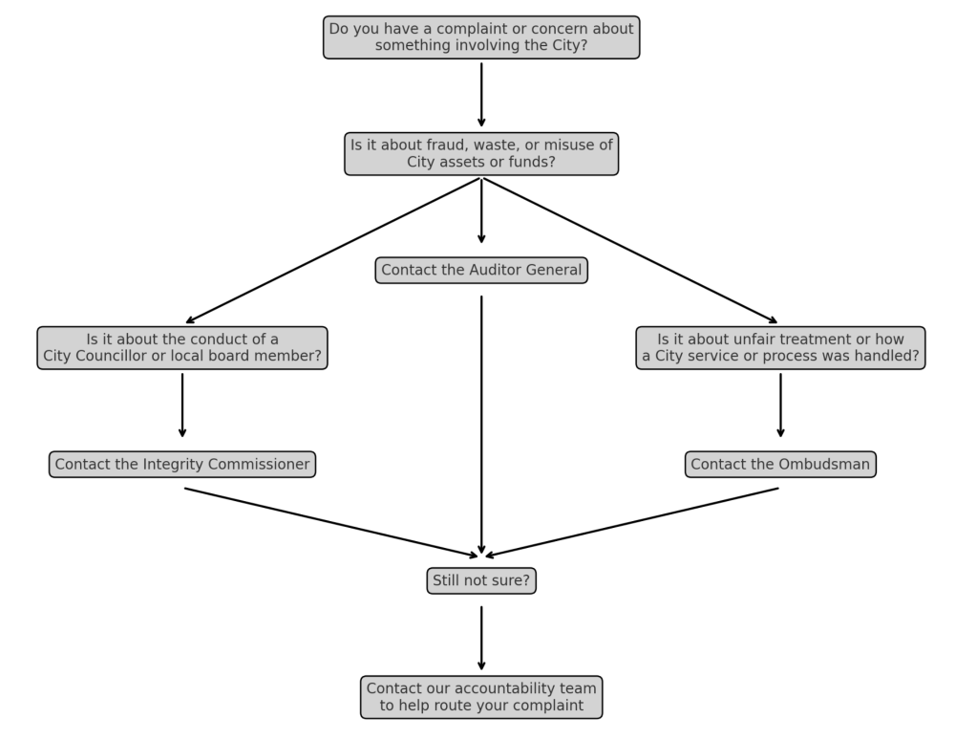Accountability and Transparency
In 2006, the Municipal Act was amended to include new provisions respecting the accountability and transparency of municipal government and its operations, as outlined in the Accountability and Transparency Policy. This new section of the Act contained several provisions, the highlights of which are:
1. Mandatory Policy Development:
Municipalities have been mandated to have, and regularly review, the following policies:
- Procurement of Goods and Services
- Hiring of Employees
- Sale and Disposition of Land
- Public Notice
- Accountability and Transparency
- Delegation of Powers and Duties
2. Mandatory Public Meeting Investigation:
The Act mandates that citizens have the right to request that an investigation be conducted into the appropriateness of closed meetings of Council.
Municipalities have the ability to appoint a Meetings Investigator, or alternatively, in the absence of an appointed Meetings Investigator, to have such investigations carried out by the Office of the Provincial Ombudsman.
The City of Windsor has appointed Local Authority Services Ltd. as its Meetings Investigator..
On July 17, 2017, Windsor City Council passed a new Code of Conduct for Members of Council and Local Boards.
3. Appointment of Accountability & Transparency Officers:
The Municipal Act now authorizes municipalities to appoint the following officers:
- Integrity Commissioner
- Auditor General
- Ombudsman
- Lobbyist Registrar
On October 22, 2007, City Council approved the creation of the office of Integrity Commissioner.
On September 23, 2019, by Council Resolution CR 485/2019, City Council approved the establishment of an Independent Auditor General with direct reporting to the Corporate Services Standing Committee of City Council.
For general information, contact 311. For detailed inquiries, please contact the Council Services Department at (519) 255-6222 or email clerks@citywindsor.ca
3.1 Understanding Your Municipal Accountability Offices
At the City of Windsor, we are committed to transparency, accountability, and fair treatment for all residents, businesses, and employees. Three independent offices support this mission by investigating complaints and concerns:
Topic |
The Integrity Commissioner |
The Auditor General |
The Municipal Ombudsman |
| Jurisdictional Boundaries | Council and board member behaviour | Financial and operational misconduct | Administrative process and fairness |
| Legislative Authority | Municipal Act, 2001, Sections 223.3 to 223.8 Council-appointed, reports to Council |
Municipal Act, 2001, Section 223.19 Auditor General Charter Independence from administration and Council; reports directly to Council |
Municipal Act, 2001, Sections 223.13 to 223.24 |
| Mandate | Provides advice and education on Council/board member conduct Investigates alleged violations of the Code of Conduct Administers Municipal Conflict of Interest Act (MCIA) matters |
Provides objective and independent assessment, advice and assurance with respect to governance, risk management, accountability and performance Administers the Concerned Citizen and Employee Hotline regarding fraud, waste or misuse as it relates to City assets |
Investigates complaints about administrative unfairness, delay, or non-responsiveness Focuses on services, process, and procedural fairness Mandated to act independently and impartially |
| Complaint Coverage | Focused on conduct of:
|
Investigates systemic issues and individual misconduct relating to:
|
Applies to staff and administration, not elected officials |
| Limitations | Cannot investigate City staff or administrative decisions Does not cover systemic service delivery issues No authority over contractor or third-party behaviour |
Does not address personal treatment or interpersonal complaints unless tied to misuse of assets Cannot mediate fairness or personnel disputes unless systemic misuse is involved |
Cannot override political decisions Cannot enforce disciplinary action Recommends, but does not compel, corrective action |
| Contact Sites |
Here is a simplified decision tree to help you determine to whom to submit your complaint:

All complaints are treated with confidentiality and respect. We believe in upholding the highest standards of integrity in how your city is run.
